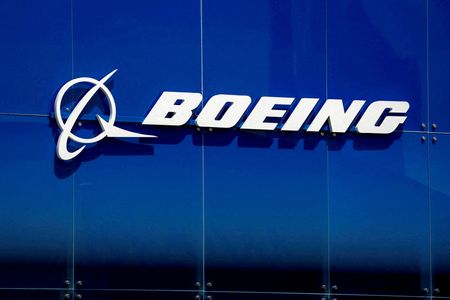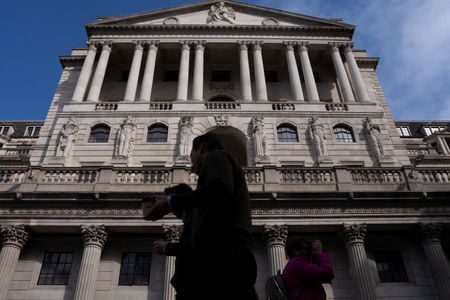By Shivansh Tiwary and Tim Hepher
(Reuters) -Aerospace companies are preparing for the next chapter in a new trade war as the European Union draws up expected counter-measures against Boeing jets in retaliation for 10% U.S. tariffs on European goods such as Airbus planes, industry sources said.
The tariffs would mark the first time since 2021 that the two trade powers, home to the world’s dominant planemakers, have imposed import taxes affecting the $150 billion jet industry.
The European Commission will on Thursday announce details of its next counter-measures against U.S. tariffs should negotiations with Washington fail, European Trade Commissioner Maros Sefcovic said in Singapore on Wednesday.
The Financial Times reported on Wednesday that the European Union intended to propose tariffs on Boeing jets.
Civil aircraft would be included on a list of roughly $100 billion in annual U.S. imports to be targeted, the FT said, citing two people familiar with the matter.
Boeing and the European Commission declined comment.
The EU faces U.S. tariffs of 25% on its steel, aluminum and cars and so-called “reciprocal” tariffs of 10% for almost all other goods, including aircraft. This could rise to 20% after U.S. President Donald Trump’s 90-day pause expires on July 8.
European carriers have hundreds of jets on order with Boeing, banking on a booming aerospace market, but potential levies could significantly increase prices of those aircraft.
UNITED FRONT
Industry sources have said the EU is expected to move to ensure a level playing field on tariffs between Boeing and Europe’s Airbus by retaliating to Washington’s levies, while the industry lobbies in unison to remove all tariffs.
Unlike a previous tariff conflict focused on aviation in 2020 and 2021, European and U.S. aerospace companies have struck a similar note in calling for a return to a duty-free status and Boeing and Airbus have not clashed head-on over tariffs.
Airbus CEO Guillaume Faury called last week for a return to tariff-free trading for aerospace, joining a chorus of U.S. industry leaders seeking relief from a growing tariff war in which Airbus warned there could be “only losers”.
Speaking earlier this week, Faury said the sequence seen five years ago, when the U.S. imposed tariffs on Airbus jets, followed by counter-tariffs from the EU in a pair of World Trade Organization subsidy cases, had succeeded in leading to a truce.
The aerospace industry has called for a return to a 1979 deal between 33 nations that broadly spared aircraft and parts from tariffs. Boeing CEO Kelly Ortberg told a Congressional hearing last month that the planemaker wanted free trade.
Irish carrier Ryanair last week threatened to cancel orders for hundreds of Boeing jets if a U.S.-led tariff war led to materially higher prices, implying that it would aim to hold Boeing contractually responsible for any European retaliation.
The threat by Europe’s largest low-cost carrier and one of Boeing’s biggest customers was the latest sign of a potential reordering of the global aerospace industry if Trump does not exempt the sector from his tariff plans.
But with the only viable alternative Airbus sold out for the rest of the decade, and aerospace contracts giving only limited scope for cancellation, industry sources said Ryanair and other airlines may find it hard to carry out outright cancellations.
Delta Air Lines has said it would defer taking delivery of Airbus aircraft built in Europe if tariffs continue.
(Reporting by Shivansh Tiwary in Bengaluru and Tim Hepher in Paris. Editing by Krishna Chandra Eluri and Mark Potter)











